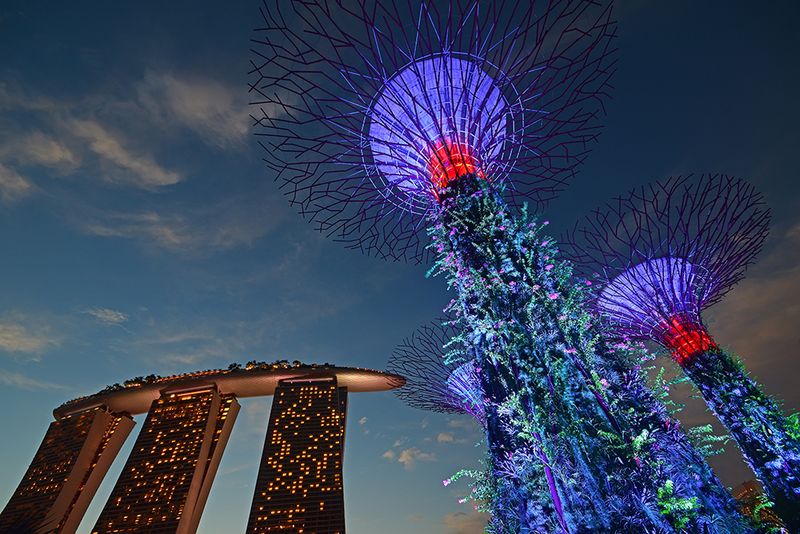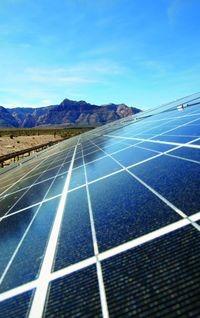Bank of the Year – DBS Bank
2024 has been a challenging year for the Asia-Pacific region as many of the projects in the pipeline are still ongoing with loans signings targeted to be held in the next few years.
However, there were a few exceptional banks whose books remained busy throughout the year, with a list of diverse mandates and booking commitments. One of these was Singapore-based DBS Bank which has at least 20 financial advisory mandates spanning multiple countries in the region and in various industries, some of which are a first, while others are complex and pioneering.
The regional bank has a project finance department with about 30 staff, split into four teams located in Singapore, China, South Korea and Australia. It is headed by Ganesh Padmanabhan who took over the role from Subash Narayanan in March last year.
The bank expects to close 17 PF transactions by the end of this year and some of these are new areas which are riskier and thus tougher. In Indonesia, the bank led the first blended financing for a water PPP project, the Karian Serpong water treatment plant of K-Water and Adhi Karya. It raised a 20-year loan of about US$140m, provided by DBS, which had a Kexim ECA cover, and ADB and IFC.
In Singapore, it led a S$60.5m (US$45m) loan for a 13.3MW biomass project for Rexus Bioenergy – not that large but it is the first biomass deal in the city state. It also was the adviser and lender to Terrenus Energy’s 277MW solar portfolio, also known as SolarNova 6. This is the largest solar project in the country to date and boasts multiple corporate offtakers.
DBS was part of the massive Changhua 4 financing in Taiwan, PFI's Power Deal of the Year Award winner. It also completed the financing for SP Group’s 250MW solar portfolio in Vietnam.
In India, the bank was sole lender on the first PF transaction in the smart meter sector, again showing its willingness to lead the way to bring project financing into new sectors. Singapore state investor GIC and local Indian player Genus Power partnered for a smart meters platform and raised their first project financing, for the outlay of up to 770,000 smart meters in Assam under a 10-year concession with Assam Power Distribution Corp. GIC and Genus have plans for a US$2bn initial outlay on smart meters in India, suggesting similar transactions to come.
DBS asserted its presence in Australia this year, and demonstrated a willingness to lend on some of the more complex and innovative transactions in the clean energy space.
The bank was one of 11 local and international banks that participated in the A$725m project financing of Akaysha Energy’s 415MW four-hour Orana BESS, winner of PFI’s Asia-Pacific Battery Deal of the Year Award. The transaction has established virtual tolling offtakes as a financeable structure for standalone batteries, as increasingly Australian project sponsors are entering into this type of offtake structure to enable operational flexibility.
It has built and cemented a relationship with the BlackRock-owned Australia-based batteries developer Akaysha Energy, having earlier in 2024 been a lender on a financing of two of Akaysha’s batteries in New South Wales. The Brendale and Ulinda Park BESS projects reached financial close at the same time with the same group of seven local and international banks providing A$250m of debt. Ulinda Park BESS features lithium-iron phosphate technology from Powin and has a 10-year revenue swap contract with Re2, rather than a vanilla tolling offtake.
DBS was financial adviser for Singapore-based Metis Energy’s first Australian renewable energy project, the 111MW Gunsynd Solar Farm in Goondiwindi, Queensland. It was the bank's first financial advisory mandate in Australia, resulting in A$111m of project debt provided by three banks including DBS. The deal was a green loan, with DBS also serving as one of the green loan coordinators.
Power Deal of the Year – Changhua 4
The year ended with the financial close of a 20-year US$1.6bn stapled financing for a 583MW Greater Changhua 4 offshore wind project. The sponsors, each holding a 50% stake, are Orsted and Cathay Life Insurance, a subsidiary of Cathay Financial Holdings, an investor in Orsted’s Greater Changhua 1 Offshore Wind Farm.
The wind farm, called the Trinity project, is the last of the offshore wind projects awarded under the Round 2 tender conducted by Taiwan’s Ministry of Economic Affairs in 2018. The ability to conclude the deal in a market where most lenders already have significant exposure in the offshore wind sector, coupled with political tensions, was remarkable.
It may indeed be the last in its batch but it managed to register a few firsts. Cathay Life’s 50% stake marks the first major direct equity investment of a Taiwanese insurer in an offshore wind project, bigger than the 25% stake held by Cathay PE in Changhua 1 scheme. The significant participation of Taiwanese state-owned banks in the deal is a feature that stands out.
It is also the first offshore wind financing guaranteed by the National Credit Guarantee Administration, and the first time that state-owned First Commercial Bank has taken the role as an export-import bank (T-Exim) facility agent in an offshore wind financing project.
The project is backed by a 100% offtake under a 20-year fixed-price corporate power purchase agreement with Taiwan Semiconductor Manufacturing Co, the first offshore wind project in Asia to do so. The deal is further sweetened with Orsted staying as the EPC contractor and will provide long-term O&M services.
Greater Changhua 4 is currently under construction alongside Greater Changhua 2B which is 100% owned by Orsted. The two wind farms are targeted to be completed by the end of 2025.
Financial advisers HSBC and CTBC Bank have put together a multi-tranche financing package from 15 financial institutions – six ECAs and 15 commercial lenders. The ECAs are Credendo, the Export and Investment Fund of Denmark, Export Finance Australia, Korea Trade Insurance Corporation, National Credit Guarantee Administration and UK Export Finance.
The local private banks are CTBC Bank, Taipei Fubon Commercial Bank, and E Sun Commercial Bank; the three state-owned banks are First Commercial Bank, Mega International Commercial Bank, and Land Bank of Taiwan. The international banks are ANZ, Citibank, Credit Agricole CIB, DBS Bank, HSBC, OCBC, Standard Chartered, Societe Generale and Korea Development Bank.
HSBC and CTBC were the international and local financial advisers to Orsted. Lenders’ counsel was White & Case while the borrower had Linklaters. Cathay had Greenberg Traurig as legal adviser for their investment. Part of the debt package includes an equity bridge loan supporting Cathay’s acquisition.
Battery Deal of the Year – Orana
Akaysha Energy has raised one of the largest project financings to date for a standalone battery project at more than A$725m, on a project that features Australia’s largest virtual offtake contract as well as a four-hour long duration. Akaysha Energy’s 415MW/1.66GWh Orana Battery Energy Storage System is PFI’s Asia-Pacific Battery Deal of the Year 2024.
Global asset manager BlackRock acquired Melbourne-based batteries developer Akaysha Energy in 2022 with a A$1bn commitment to the company, when Akaysha was in development work to ready its pipeline of nine BESS developments in Australia. Orana BESS is the fourth battery scheme that Akaysha has brought into the construction stage, and the largest to be project financed.
In July 2024, Akaysha reached financial close on a A$650m three-year non-recourse construction loan for the Orana BESS. Lenders are Australia and New Zealand Banking Group, BNP Paribas, Commonwealth Bank of Australia, Canadian Imperial Bank of Commerce, DBS, ING, Mizuho Bank, Rabobank, Siemens Bank, SMBC and Westpac. Lenders also provided roughly A$75m of letters of credit for the project’s security obligations.
The project has a 12-year virtual toll offtake agreement with generator and retailer EnergyAustralia, which allows it to notionally charge and discharge 200MW of virtual capacity within pre-agreed daily bidding parameters. Akaysha physically operates the lithium-ion battery. The potential for the operator to differ the actual charging and dispatching from the offtaker’s “virtual” instructions, means revenue upside and downside exposure that lenders had to accommodate.
Virtual offtakes are increasingly popular for batteries in Australia so this deal has offered a template for such financings, while the four-hour duration technology is also growing in prevalence.
The battery also benefits from a 10-year firming long-term energy service agreement (LTESA) with the NSW government, funded by the federal government’s Capacity Investment Scheme. The firming LTESA is for all of the project’s 415MW capacity and guarantees a base level of revenues, to provide comfort to lenders.
The battery is located within the Central-West Orana Renewable Energy Zone in New South Wales. Commercial operations are expected in 2026. Tesla will provide its Megapack lithium-ion technology and Consolidated Power Projects is contractor for balance of plant.
Advisers on the project’s financing are Azure Capital and Allens for Akaysha, and King & Wood Mallesons was lenders’ legal adviser. Ashurst was project counsel on the virtual toll contract. Ashurst, Aurora, DNV, KPMG, JPA and Marsh were project due diligence advisers.
Solar Deal of the Year – FRV Australia
FRV Australia has successfully raised a A$1.2bn debt package to refinance a 1.1GW primarily solar portfolio in Australia. The deal is the first large renewables portfolio financing in Australia where all assets in operations are solar, a technology which has faced a challenging market and energy grid dynamic in recent times in the country. The deal includes the 100MW/200MWh Terang standalone battery financed on a fully merchant basis. FRV Australia’s solar portfolio financing is PFI’s Asia-Pacific Solar Deal of the Year.
The A$1.2bn debt package includes a term loan that refinances the existing asset-level debt of the portfolio, plus a letter of credit facility and a working capital facility. It has refinanced A$880m of existing debt and provided financing for construction assets. Lenders were Agricultural Bank of China, China Construction Bank, ING, Intesa Sanpaolo, MUFG Bank, Mizuho Bank, NordLB, United Overseas Bank, Societe Generale and Westpac, and the federal government’s Clean Energy Finance Corporation.
Other large renewables portfolio financings of solar with wind technology and some batteries have benefited from diversification of pricing risk. Lenders and advisers worked since 2023 with the sponsor to negotiate breakevens, undertake risk analysis and size the debt appropriately. The loan will provide FRV Australia with a flexible funding platform for future financings to support the 2.1GW development pipeline, including solar and battery projects.
FRV Australia is owned by Saudi Arabian family-owned company Abdul Latif Jameel Energy, 51%, and Canadian pension fund OMERS, 49%.
The portfolio of eight projects refinanced has installed capacity of more than 1.1GW and includes a construction stage solar project. Operational assets are the 109MWdc Sebastopol solar farm in New South Wales, the 141MWdc Metz solar farm in NSW, the 70MWdc Moree solar in NSW, the 89MWdc Goonumbla solar in NSW, the 100MWdc Winton solar in Victoria, the 126MWdc Lilyvale solar in Queensland and the 5MW Dalby hybrid solar-battery project in Queensland, a co-located 2.45MW solar array and 2.5MW/5MWh battery.
The two construction stage assets financed are the 350MWdc A$450m Walla Walla solar farm in NSW, financed in December 2022, and the merchant 100MW/200MWh Terang BESS which entered construction in August this year as FRV Australia’s first large-scale BESS project. The battery includes grid-forming inverters.
Macquarie Capital was financial adviser and White & Case was legal adviser to FRV Australia. Allens was lenders’ legal counsel.
Data Centre Deal of the Year – AirTrunk
Hyperscaler data centre specialist AirTrunk is expanding its first data centre in Johor, Malaysia, called JHB1. To finance the development of its data centre in Malaysia and to provide growth capex for its group portfolio assets, its unit AirTrunk Singapore Six raised a sustainability-linked S$530m (US$393m) facility.
The loan, which has a tenor of five years, will be used to develop part of the data centre. It is a hybrid facility with no recourse to the sponsor.
It has six mandated lead arrangers: Credit Agricole, Deutsche Bank, DBS, HSBC, ING and MUFG. However, four of these took zero final holds as they will prepare for another incremental facility that AirTrunk is planning.
Other arrangers and lenders were CBA, CTBC Bank, E Sun Commercial Bank, Intesa Sanpaolo, Landesbank Baden Wuerttemberg, Mizuho, RHB Bank, Shinhan Bank, Societe Generale, Taipei Fubon Bank, Taishin International Bank and United Overseas Bank.
The SLL is tied to key performance indicators including carbon usage effectiveness, operating power usage effectiveness, operating water usage effectiveness, gender diversity and gender pay equity.
The loan supports the construction of JHB1 which will have an initial 50MW capacity, later to be expanded to more than 150MW. The JHB1 campus will cover 10.3 hectares on the southern tip of the Malay Peninsula and service a major cloud availability zone for AirTrunk’s customers. It will offer a strong domestic and international connection to regional technology hubs including Singapore. Gilbert & Tobin was the lenders' counsel and Norton Rose Fulbright was the sponsor counsel.
This year, ownership of AirTrunk changed hands which required significant financing. After a competitive auction, a consortium of Blackstone and minority 12% partner Canada Pension Plan signed a deal to purchase an 88% majority stake in AirTrunk from Macquarie Asset Management, Public Sector Pension Investment Board and management and the founder Robin Khuda.
Blackstone’s A$24bn (US$16bn) acquisition of AirTrunk is the largest ever data centre deal globally, the largest deal in Australia this year and the largest investment in Asia-Pacific by Blackstone.
The overall A$24bn enterprise valuation of AirTrunk includes its existing debt and, more unusually for the EV calculation, includes capital expenditure for committed projects. Blackstone is taking out A$5.5bn (US$3.7bn) of debt to back the purchase, comprising a A$2bn term loan and an A$3.5bn revolving credit facility.
AirTrunk is the largest data centre operator in Asia-Pacific, with more than 800MW of capacity committed to customers and owns land that can support over 1GW of future growth across the region. Founded in Australia in 2015, AirTrunk has 11 sites in Australia, Japan, Hong Kong, South Korea, Singapore and Malaysia.
India Deal of the Year – ReNew Hans Urja Solar
ReNew Power has raised a ¥35.3bn yen-denominated project finance loan for a 600MW greenfield solar project in Jaisalmer in Rajasthan, which will feature solar PV modules produced at ReNew’s own manufacturing facility. The project has tapped Japanese yen from various Japanese and European banks, optimising financing costs through a flexible approach to currencies and benchmarks. The ReNew Hans Urja Solar project is PFI’s India Deal of the Year.
ReNew Power, owned by parent ReNew Energy Global listed on the Nasdaq, is a well-established renewables developer, but has more recently constructed its own solar PV module manufacturing facilities. The ReNew Hans Urja Solar project, at an enormous 600MWac capacity, will use only solar modules from ReNew’s own facilities. This marks the first project using only its own modules that ReNew has financed in the international bank market. The Indian government has made the utilisation of domestic solar modules a priority, having first introduced regulations in 2021.
Lenders provided a ¥35.3bn five-year project finance loan with green loan credentials. SMBC was mandated lead arranger, documentation bank, green loan coordinator, hedge bank, LC bank and account bank. It is joined by BNP Paribas, Credit Agricole CIB, MUFG and Societe Generale as mandated lead arrangers. Credit Agricole was also a hedging bank. The letter of credit facility, denominated in rupees, was provided by local branches of the lenders to finance procurement of solar modules and other equipment. The tied LC loan is sized at up to 65% of the project finance facility, circa US$150m.
The financing complies with the green loan principles of the Asia Pacific Loan Market Association, Loan Market Association and the Loan Syndications & Trading Association. SMBC and MUFG were green loan coordinators.
Solar Energy Corporation of India is offtaker for the solar energy under two long-term offtake agreements. Operations were achieved in 2024. The 600MW project spread over 2,000 acres has a competitive PPA tariff at Rs2.18/kWh.
The lenders were advised by Cyril Amarchand Mangaldas and Herbert Smith as legal advisers.
Resources Deal of the Year – Onslow
Morgan Stanley Infrastructure Partners acquired a 49% shareholding in the captive road that serves the Onslow Iron mine from its mining company builder Mineral Resources, in an innovative and replicable deal that brings institutional capital into supporting infrastructure to unlock miners’ capital for future growth. The financing of Onslow Iron Road Trust is PFI’s Asia-Pacific Resources Deal of the Year 2024.
MSIP has paid A$1.1bn upfront to Mineral Resources (MinRes) to acquire a 49% shareholding in Onslow Iron Road Trust, following a competitive auction, and will pay a further A$200m subject to the Onslow mine achieving nameplate production by June 2026. MSIP raised a A$775m five-year non-recourse loan for the acquisition, underwritten by mandated lead arrangers Deutsche Bank, Natixis and Standard Chartered and successfully syndicated to bring in Bank of China, China Construction Bank, China Everbright Bank, ICBC, Metrics Credit Partners, SMBC and United Overseas Bank. MinRes maintained a 51% controlling stake in the road’s special purpose vehicle.
The banks have provided the debt against a toll fee that the road trust will receive from the mine’s owner. The sellside devised a life-of-mine, CPI inflation-adjusted tolling fee structure, set at A$8.04 per tonne of iron ore capped at 40m wet tonnes per year. MinRes will receive any tolling fees above the cap, and after 30 years the tolling fee will reset to a reduced rate.
Challenges to bankability that were mitigated by the deal’s structuring included the risk of the mine not achieving nameplate capacity, iron ore price volatility, mining operations risks and the minority ownership position held by MSIP.
This creation of and monetisation of a trust for supporting infrastructure could be replicable for other miners, where they have undertaken significant spend on infrastructure such as roads, rail and port to enable remote mines.
A fleet of 120 autonomous driverless road trains will operate on the 150km dedicated private haul road, between the Onslow Iron Mine and MinRes' transhipment hub at the Port of Ashburton. MinRes partnered with Hexagon AB for the world-first autonomous technology.
The A$3bn Onslow iron mine project in the Pilbara region in Western Australia has this year entered operations and made its first shipment of iron ore in May. It is expected to achieve its nameplate run rate of 35m tpa from June 2025. MinRes, 60.5%, Baowu, AMCI and Posco own the Onslow mine.
Azure Capital was financial adviser, Grant Samuel was debt adviser and Allens was legal adviser to MSIP. White & Case was lenders’ legal counsel. WSP, SRK and Thompson Clarke provided technical advice, Aon was insurance adviser and Wood Mackenzie provided market advice. Deloitte was tax adviser, PwC was ESG adviser and EY was accounting adviser. JP Morgan was financial adviser to MinRes and Herbert Smith Freehills was legal adviser.
Transport Deal of the Year – Ninoy Aquino International Airport
This project has attracted much interest, but in the end, the Philippine Department of Transportation dropped all unsolicited proposals, went through the tender process, and selected one group – the San Miguel consortium, which offered the highest revenue sharing ratio, which is 82.16% of gross revenue. It has been described as one of the most ambitious and impactful airport rehabilitation efforts in South-East Asia and globally.
The winning consortium comprises San Miguel Holdings Corp (33%), RMM Asia Logistics, RLW Aviation Development and Incheon Airports. They have set up the project company New NAIA Infra Corp (NNIC) which will operate and manage the airport.
Total financing of Ps116.2bn (US$2bn) was raised and signed in September 2024. Of this, Ps80bn or US$1.4bn was PF loan and the remaining amount of about US$600m was equity financing. The 15-year PF loan was split into a Ps28bn upfront payment and Ps52bn capex facility to finance construction and renovations and others. The PF debt was overwhelmingly oversubscribed by local banks such that there was no more scope for international lenders including multilaterals.
Loan tenor was 15 years extendable for another 10 years, along with the extension of the concession. BDO Capital was the mandated lead arranger, and lenders are BDO Unibank, Bank of Commerce, Asia United Bank, China Banking Corp, Security Bank, and DBP.
Legal counsel to the borrower is Picazo Buyco Tan Fider & Santos. Lenders' legal counsel are SyCip Salazar Hernandez & Gatmaitan and Lee & Ko as Korean counsel. DOTr had Asian Development Bank as its transaction adviser, which in turn had PwC as commercial consultant, Pinsent Masons as international counsel and PJS Law as local counsel in its team.
The project is of great significance to the Philippines. The airport is overused and overwhelmingly exceeds its capacity, thus rehabilitation and expansion is much needed. This project is possibly the largest brownfield airport PPP project effected anywhere in the world at the time of its launch.
The project involves extensive terminal expansions to accommodate an increase in passenger traffic from 47m to 62m passengers per annum. There will also be comprehensive upgrades to airside infrastructure, and the modernisation of air traffic control systems. The NAIA rehabilitation project is also committed to sustainability. It will integrate eco-friendly technologies such as solar panels, energy-efficient systems, and rainwater harvesting and aim to have at least 20% of the total energy requirement of the airport to come from renewable sources.













